Why Demetrious Johnson Eviscerating The UFC Matters
Why Demetrious Johnson Eviscerating The UFC Matters
UFC flyweight king Demetrious Johnson sounded off on the promotion he fights for and it's an important look at the culture of MMA.
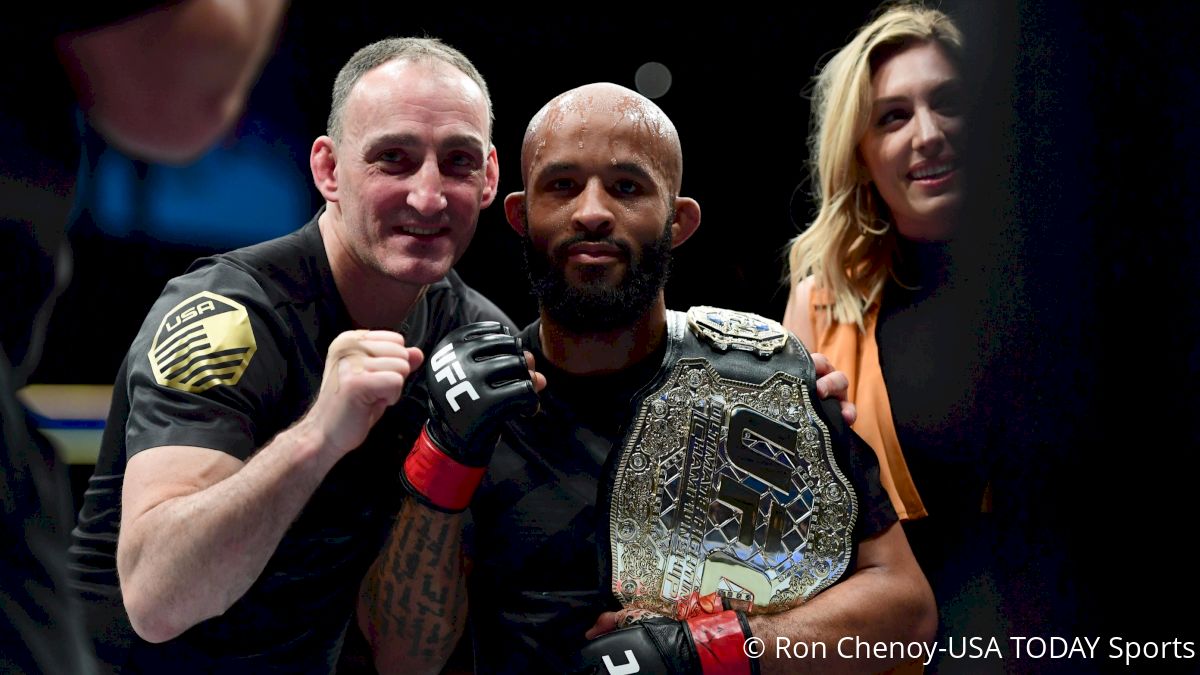
By Elias Cepeda
If you haven't yet, do yourself a favor and read the statement flyweight world champion Demetrious Johnson's released early Monday morning. It will be the most important MMA-related item you will have read so far this year.
Johnson's letter does its own heavy lifting and speaks for itself, but it is important to take a step back and reflect on how and why it is so significant. In summation, Johnson's statement gives a detailed defense of himself in light of UFC president Dana White's recent insults, and also serves to condemn what the fighter correctly calls the UFC's bullying business practices.
The longtime reigning champion's statement is nothing short of the most comprehensive public pulling back of the curtain by an elite UFC fighter in the promotion's history, and stands as the most detailed critique, to date, of the MMA company's business model from an athlete at his level.
His account also fits perfectly the pattern made clear by statements on labor relations, ranging from brusque to insulting, from the UFC's president over the entirety of his tenure as well as what probing reporters have been hearing for years from the company's athletes about what goes on behind closed doors during their dealings with the promotion.
All of that alone makes Johnson's statement significant, but it is also notable because it gives pause to the usually uninterrupted rhythm of discontented fighters staying quiet in public about private dealings with the UFC while White resorting to bad-mouthing them in public at his whim with a press corps usually so eager for headlines tied to big names that they regurgitate those statements without much in the way of challenging or analysis.
That cycle typically allows White to go on the offensive and frame the narrative of contract battles whenever they get sticky and is a key part of the one-sided negotiations between UFC management and its athletes that Johnson shines light on in his statement.
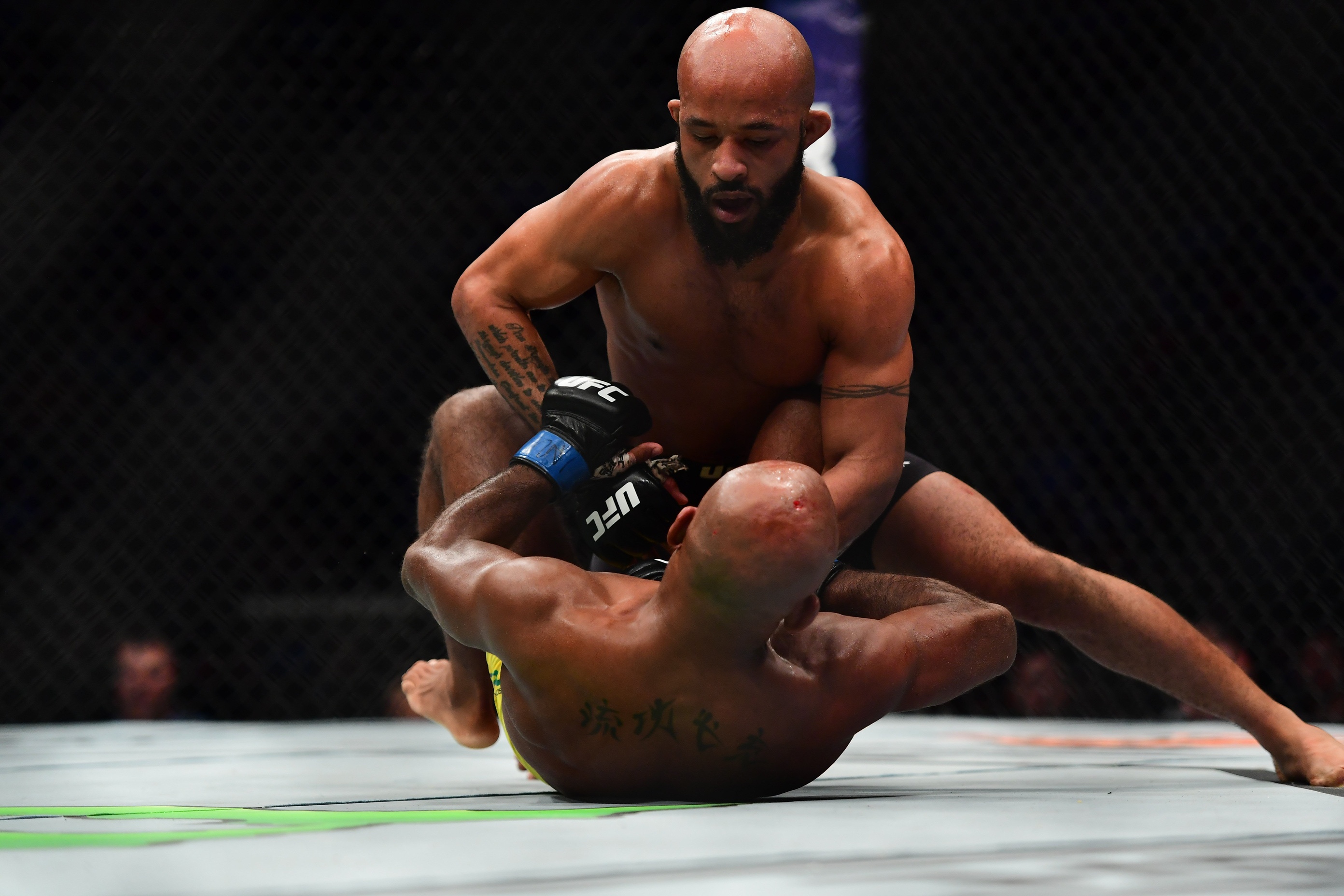
Apr 15, 2017; Kansas City, MO, USA; Demetrious Johnson (Red Gloves) and Wilson Reis (Blue Gloves) fight during UFC Fight Night at Sprint Center. Mandatory Credit: Ron Chenoy-USA TODAY Sports
Johnson tells his own specific story, but it also cuts to the core of the way the UFC does and has always operated. Unlike athletes in many other sports leagues that we watch on network television or that have big-money and exclusive branding deals, UFC athletes currently have no union or association.
So, UFC athletes don't have a collective seat at the table to negotiate royalties from the usage of their names and likeness that the promotion claims they sign away for life with even the lowest-paying, first-timer UFC contract.
UFC athletes are told what to wear, when and where to speak in conjunction with their job, are tied to exclusive contracts that the promotion argues extends even past the sport of MMA and into other fields and industries like boxing, submission grappling, and professional wrestling, yet the company does not even extend to its athletes the dignity of being designated as employees, or the legally-mandated benefits that would go with the designation.
UFC athletes currently have no collective bargaining power, no pension to be eligible for even after a long and dangerous career, no year-round health insurance, and get paid a lower percentage of revenue from the UFC than do athletes in other major sports from their leagues and teams. Most can also be released from the UFC at almost any point, meaning security in a job they are tied to exclusively on their end is almost non-existent.
Johnson says he's done staying quiet about it all, and hopes that his statement prompts UFC athletes to band together. He went at it alone, for years, hoping that being a quiet yes-man would result in better pay and treatment.
It didn't work, according to the fighter.
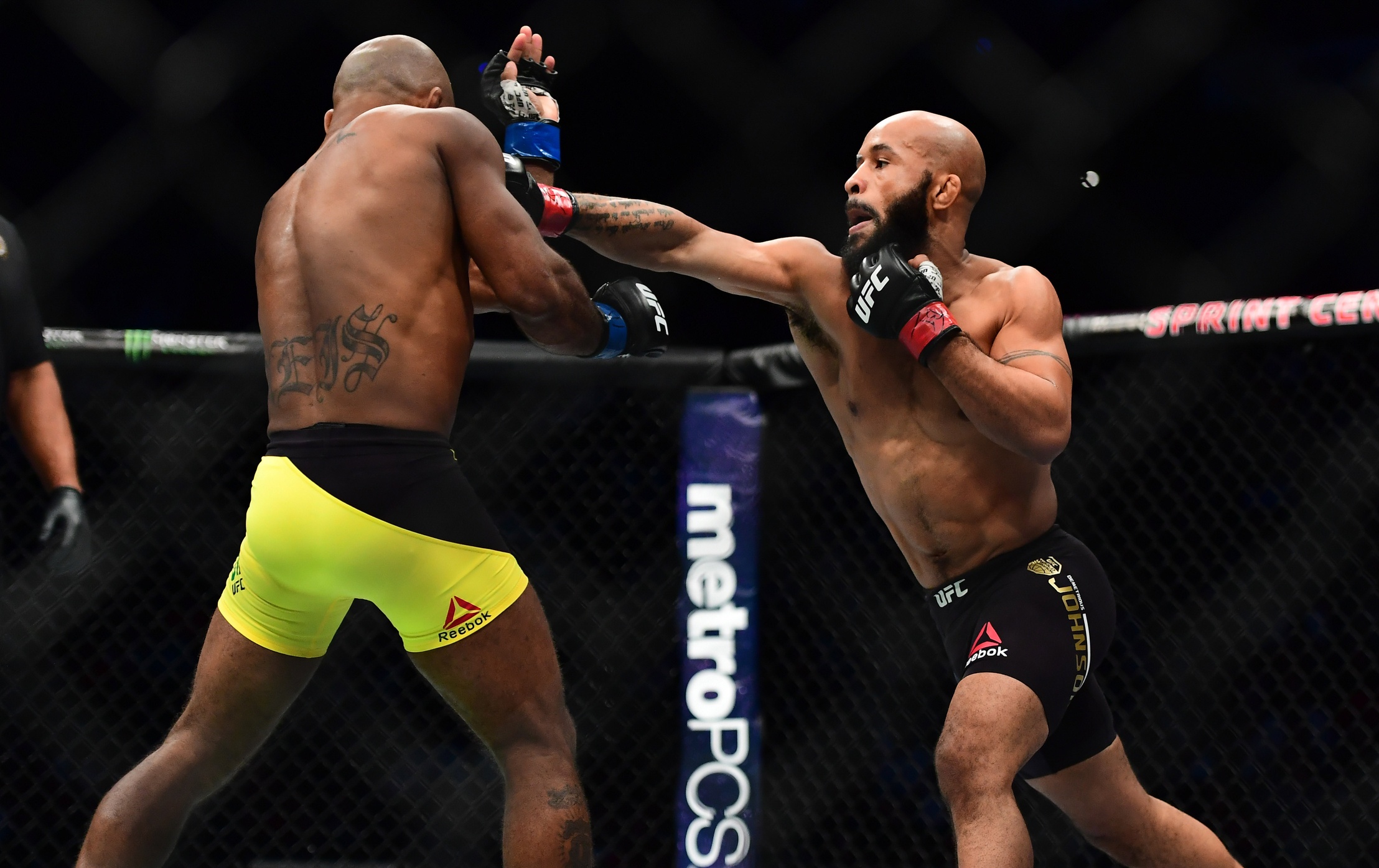
Apr 15, 2017; Kansas City, MO, USA; Demetrious Johnson (red) and Wilson Reis (blue) fight during UFC Fight Night at Sprint Center. Mandatory Credit: Ron Chenoy-USA TODAY Sports
"For years I have been a company man and kept quiet, accepting fights, doing as they asked, and always remaining humble and grateful for the opportunities provided to me through mixed martial arts," Johnson writes.
"Unfortunately, UFC's treatment and bullying has finally forced me to speak out. I've decided to speak out now as I feel my values and character as a person and a fighter are being tarnished by an organization I've done nothing but sweat and bleed for over the last seven years of my life. If it takes me speaking up and encouraging other fighters to ban together to start getting fair treatment so be it."
Johnson's tale is one of structural inequity and interpersonal abusive language from UFC management, and it is one this writer has heard countless times before, off the record, from many different fighters while covering the sport for the past 12 years.
Demetrious Johnson speaking out is rare, doing so in the detail that he does and in using a timeline of events as he does is almost unprecedented. The fact that this depressing account of disrespect and mistreatment, and athlete unhappiness is coming from the UFC's best fighter, perhaps the best it has ever had, is especially noteworthy.
Johnson's story is common. Though they didn't go into the specifics that he did, many top UFC fighters have begun to publically express their disgust at the way they are mistreated, often times by White personally, and how little power they have, to say nothing of their relatively meager pay.
That list of disgruntled top fighters includes Jon Jones, Georges St-Pierre, Cris "Cyborg" Justino (the female featherweight champ who White has singled out to publicly insult with misogynistic slurs), Anderson Silva, Randy Couture, Frankie Edgar, Mark Hunt (who is currently suing the UFC while also working for them) Jose Aldo, and Luke Rockhold, among others. Johnson has gone further than any of them except for Mark Hunt, to this date, and it could be the start of UFC athletes realizing they need to work together in order for any one of them to be treated and paid better.
Johnson's case should serve as conclusive evidence for his colleagues that playing nice with the boss man won't necessarily result in a better life for athletes or their families, and that pay and treatment won't change unless they join together in a professional association or union to use their collective power to demand change.
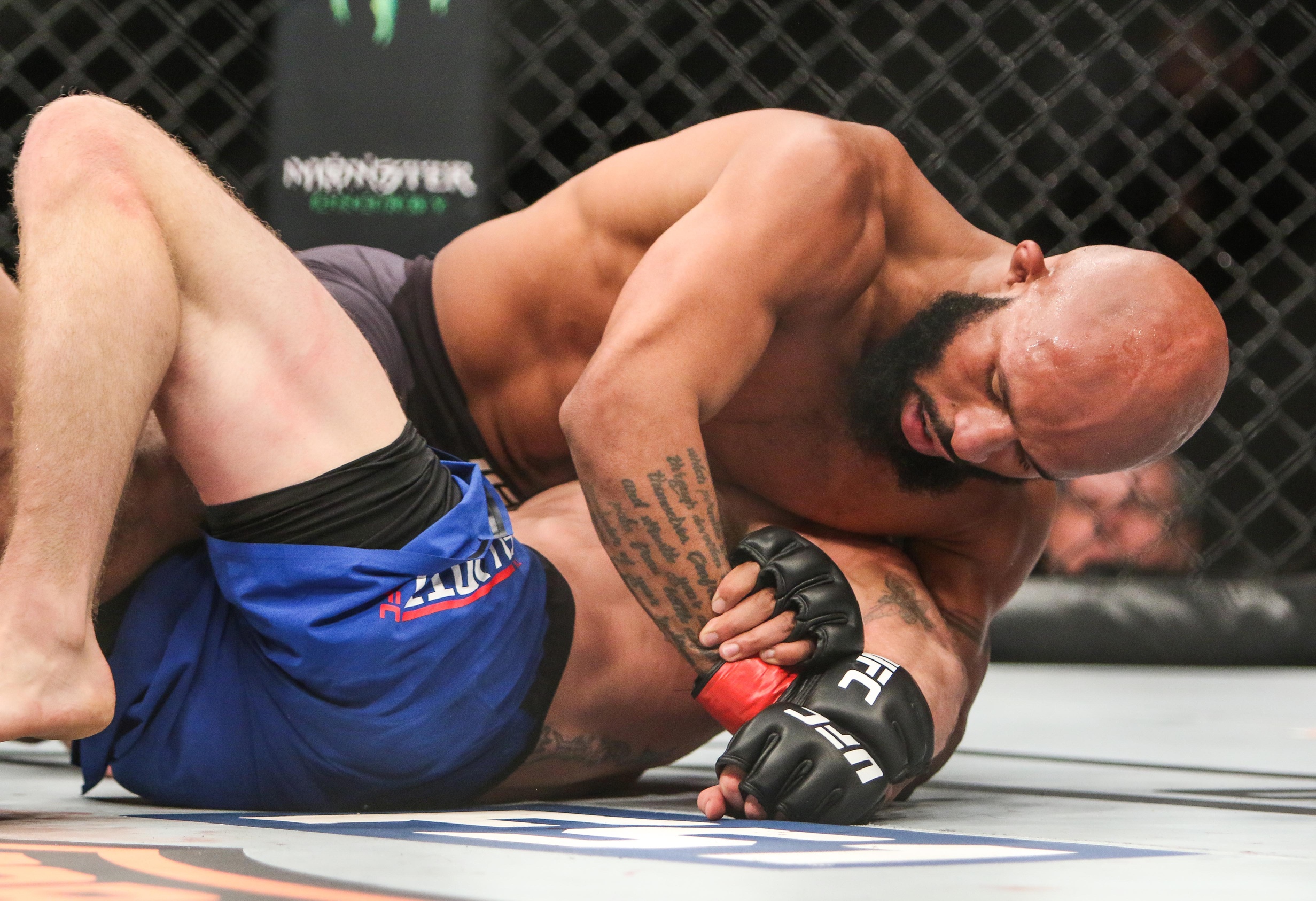
Dec 3, 2016; Las Vegas, NV, USA; Demetrious Johnson (red gloves) fights Tim Elliott (blue gloves) during the TUF tournament of champions at Palms Casino. Mandatory Credit: Tracy Lee-USA TODAY Sports
Too many UFC fighters, including Johnson, have had the professional strategy of not making waves and always saying 'yes' in hopes of getting White and the UFC brass to like them, so that they would maybe later toss them a bonus, or elect to pay for a surgery to repair something they hurt while doing their job, or give them an extra room or flight for their coaches on fight weeks.
For the most part fighters have taken this tact because White's approach to dealing with negotiations or difficult situations -- lashing out, insulting, harassing, screaming at fighters who bring up issues -- has had its intended effect.
UFC fighters are, by in large, scared of their boss and fearful of reprisal from management should they ever speak up. That used to be the rule, but at least now it has a few exceptions.
Hopefully the rest of the UFC's roster looks at Johnson's statement and realizes that staying scared and silent won't likely bring them security or fortune. If it isn't immediately clear, let's put it into perspective.
Demetrious Johnson is probably the best fighter in MMA. He may be the best to ever do it.
Leaving those debates aside, he is certainly the sport's longest-reigning champion, and about as perfect an ambassador for it as you can find in the game. Johnson long attracted major corporations like Microsoft as sponsors (until the UFC and its policies got in the way of that), puts his family front-and-center with his image outside of the cage, and he wins in exciting fashion.
"Mighty Mouse" has faced down every challenge thrown his way with hard work and steely, uncomplaining resolve. From balancing working full-time in a factory for years while fighting because working for Zuffa (the UFC's longtime parent company) didn't pay him enough to make ends meet, to fighting much larger men at bantamweight before the UFC made a flyweight division, to title fight after title fight at flyweight, Johnson has never balked, or demanded anything other fighters don't get.
Johnson wins, smiles, says polite things, and then wins some more.
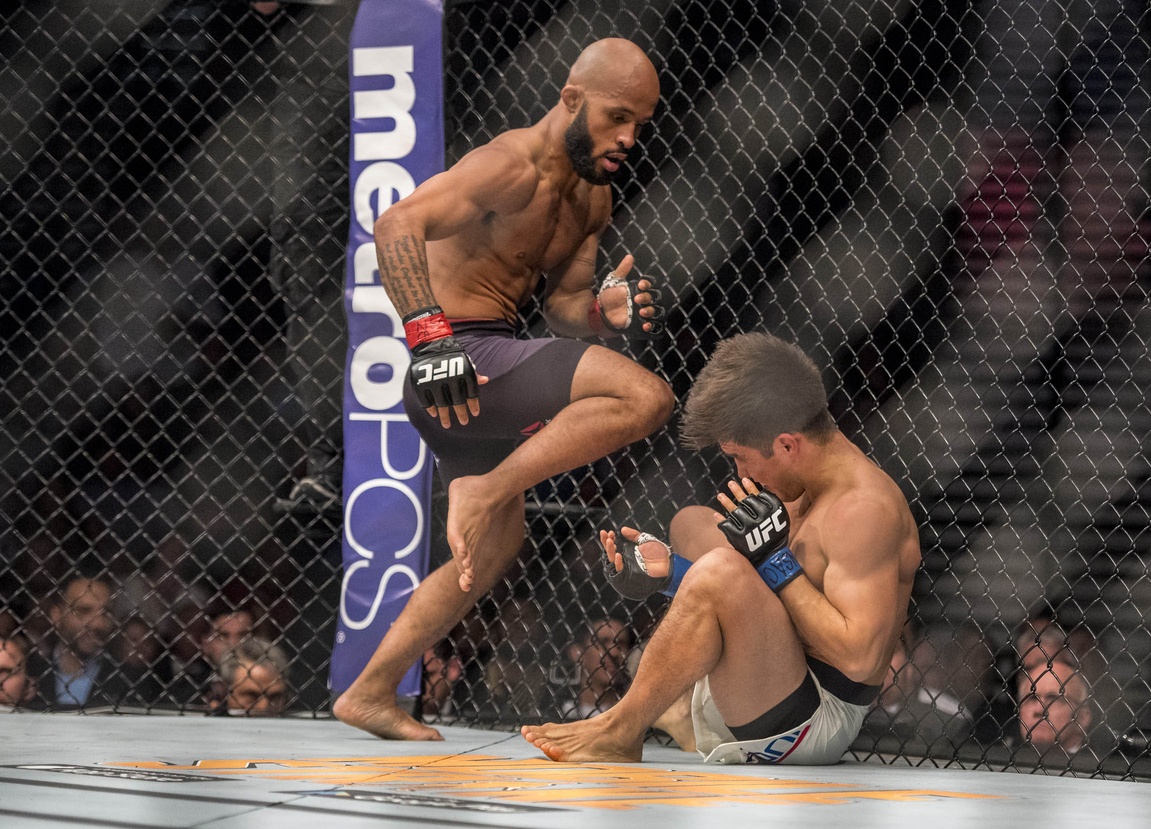
Apr 23, 2016; Las Vegas, NV, USA; Demetrious Johnson (red gloves) knocks down Henry Cejudo (blue gloves) during UFC 197 at MGM Grand Garden Arena. Mandatory Credit: Joshua Dahl-USA TODAY Sports
Other UFC fighters can now look at Demetrious Johnson's example and wonder, 'if he can't get fair treatment, can any of us?'
The answer, clearly, is 'no.' At least not if they go it alone.
As a disparate, disorganized, fearful lump of silent malcontents, UFC athletes can never hope to make their fair share and avoid mistreatment that even the promotion's elite have not even been able to avoid. Together, however, they could demand something approaching fair pay and treatment from what the UFC claims is the fastest-growing sports business in the world.
Together, the toughest athletes on earth could start showing real teeth outside of the ring and demand pay and benefits commensurate with their risk and with the billions upon billions of dollars in cash flow they've created.
If fighters don't come together, and soon, in a union or association it must be that think they can do better than Demetrious Johnson, or Georges St-Pierre, or Anderson Silva. They must also then win more and be willing to bend over backwards more than any of those legendary types for their bosses, and hang onto the hope that the 'thank you' at the end will be different than it has ever been.
If UFC fighters don't come together to do better for themselves, Dana White will have been right all along when he said that fighters would never unionize because they are too selfish to think about the greater good or the future.
Don't miss breaking news, feature stories, event updates, and more. Sign up for the FloCombat mailing list today.
If you haven't yet, do yourself a favor and read the statement flyweight world champion Demetrious Johnson's released early Monday morning. It will be the most important MMA-related item you will have read so far this year.
Johnson's letter does its own heavy lifting and speaks for itself, but it is important to take a step back and reflect on how and why it is so significant. In summation, Johnson's statement gives a detailed defense of himself in light of UFC president Dana White's recent insults, and also serves to condemn what the fighter correctly calls the UFC's bullying business practices.
The longtime reigning champion's statement is nothing short of the most comprehensive public pulling back of the curtain by an elite UFC fighter in the promotion's history, and stands as the most detailed critique, to date, of the MMA company's business model from an athlete at his level.
His account also fits perfectly the pattern made clear by statements on labor relations, ranging from brusque to insulting, from the UFC's president over the entirety of his tenure as well as what probing reporters have been hearing for years from the company's athletes about what goes on behind closed doors during their dealings with the promotion.
All of that alone makes Johnson's statement significant, but it is also notable because it gives pause to the usually uninterrupted rhythm of discontented fighters staying quiet in public about private dealings with the UFC while White resorting to bad-mouthing them in public at his whim with a press corps usually so eager for headlines tied to big names that they regurgitate those statements without much in the way of challenging or analysis.
That cycle typically allows White to go on the offensive and frame the narrative of contract battles whenever they get sticky and is a key part of the one-sided negotiations between UFC management and its athletes that Johnson shines light on in his statement.

Apr 15, 2017; Kansas City, MO, USA; Demetrious Johnson (Red Gloves) and Wilson Reis (Blue Gloves) fight during UFC Fight Night at Sprint Center. Mandatory Credit: Ron Chenoy-USA TODAY Sports
Johnson tells his own specific story, but it also cuts to the core of the way the UFC does and has always operated. Unlike athletes in many other sports leagues that we watch on network television or that have big-money and exclusive branding deals, UFC athletes currently have no union or association.
So, UFC athletes don't have a collective seat at the table to negotiate royalties from the usage of their names and likeness that the promotion claims they sign away for life with even the lowest-paying, first-timer UFC contract.
UFC athletes are told what to wear, when and where to speak in conjunction with their job, are tied to exclusive contracts that the promotion argues extends even past the sport of MMA and into other fields and industries like boxing, submission grappling, and professional wrestling, yet the company does not even extend to its athletes the dignity of being designated as employees, or the legally-mandated benefits that would go with the designation.
UFC athletes currently have no collective bargaining power, no pension to be eligible for even after a long and dangerous career, no year-round health insurance, and get paid a lower percentage of revenue from the UFC than do athletes in other major sports from their leagues and teams. Most can also be released from the UFC at almost any point, meaning security in a job they are tied to exclusively on their end is almost non-existent.
Johnson says he's done staying quiet about it all, and hopes that his statement prompts UFC athletes to band together. He went at it alone, for years, hoping that being a quiet yes-man would result in better pay and treatment.
It didn't work, according to the fighter.

Apr 15, 2017; Kansas City, MO, USA; Demetrious Johnson (red) and Wilson Reis (blue) fight during UFC Fight Night at Sprint Center. Mandatory Credit: Ron Chenoy-USA TODAY Sports
"For years I have been a company man and kept quiet, accepting fights, doing as they asked, and always remaining humble and grateful for the opportunities provided to me through mixed martial arts," Johnson writes.
"Unfortunately, UFC's treatment and bullying has finally forced me to speak out. I've decided to speak out now as I feel my values and character as a person and a fighter are being tarnished by an organization I've done nothing but sweat and bleed for over the last seven years of my life. If it takes me speaking up and encouraging other fighters to ban together to start getting fair treatment so be it."
Johnson's tale is one of structural inequity and interpersonal abusive language from UFC management, and it is one this writer has heard countless times before, off the record, from many different fighters while covering the sport for the past 12 years.
Demetrious Johnson speaking out is rare, doing so in the detail that he does and in using a timeline of events as he does is almost unprecedented. The fact that this depressing account of disrespect and mistreatment, and athlete unhappiness is coming from the UFC's best fighter, perhaps the best it has ever had, is especially noteworthy.
Johnson's story is common. Though they didn't go into the specifics that he did, many top UFC fighters have begun to publically express their disgust at the way they are mistreated, often times by White personally, and how little power they have, to say nothing of their relatively meager pay.
That list of disgruntled top fighters includes Jon Jones, Georges St-Pierre, Cris "Cyborg" Justino (the female featherweight champ who White has singled out to publicly insult with misogynistic slurs), Anderson Silva, Randy Couture, Frankie Edgar, Mark Hunt (who is currently suing the UFC while also working for them) Jose Aldo, and Luke Rockhold, among others. Johnson has gone further than any of them except for Mark Hunt, to this date, and it could be the start of UFC athletes realizing they need to work together in order for any one of them to be treated and paid better.
Johnson's case should serve as conclusive evidence for his colleagues that playing nice with the boss man won't necessarily result in a better life for athletes or their families, and that pay and treatment won't change unless they join together in a professional association or union to use their collective power to demand change.

Dec 3, 2016; Las Vegas, NV, USA; Demetrious Johnson (red gloves) fights Tim Elliott (blue gloves) during the TUF tournament of champions at Palms Casino. Mandatory Credit: Tracy Lee-USA TODAY Sports
Too many UFC fighters, including Johnson, have had the professional strategy of not making waves and always saying 'yes' in hopes of getting White and the UFC brass to like them, so that they would maybe later toss them a bonus, or elect to pay for a surgery to repair something they hurt while doing their job, or give them an extra room or flight for their coaches on fight weeks.
For the most part fighters have taken this tact because White's approach to dealing with negotiations or difficult situations -- lashing out, insulting, harassing, screaming at fighters who bring up issues -- has had its intended effect.
UFC fighters are, by in large, scared of their boss and fearful of reprisal from management should they ever speak up. That used to be the rule, but at least now it has a few exceptions.
Hopefully the rest of the UFC's roster looks at Johnson's statement and realizes that staying scared and silent won't likely bring them security or fortune. If it isn't immediately clear, let's put it into perspective.
Demetrious Johnson is probably the best fighter in MMA. He may be the best to ever do it.
Leaving those debates aside, he is certainly the sport's longest-reigning champion, and about as perfect an ambassador for it as you can find in the game. Johnson long attracted major corporations like Microsoft as sponsors (until the UFC and its policies got in the way of that), puts his family front-and-center with his image outside of the cage, and he wins in exciting fashion.
"Mighty Mouse" has faced down every challenge thrown his way with hard work and steely, uncomplaining resolve. From balancing working full-time in a factory for years while fighting because working for Zuffa (the UFC's longtime parent company) didn't pay him enough to make ends meet, to fighting much larger men at bantamweight before the UFC made a flyweight division, to title fight after title fight at flyweight, Johnson has never balked, or demanded anything other fighters don't get.
Johnson wins, smiles, says polite things, and then wins some more.

Apr 23, 2016; Las Vegas, NV, USA; Demetrious Johnson (red gloves) knocks down Henry Cejudo (blue gloves) during UFC 197 at MGM Grand Garden Arena. Mandatory Credit: Joshua Dahl-USA TODAY Sports
Other UFC fighters can now look at Demetrious Johnson's example and wonder, 'if he can't get fair treatment, can any of us?'
The answer, clearly, is 'no.' At least not if they go it alone.
As a disparate, disorganized, fearful lump of silent malcontents, UFC athletes can never hope to make their fair share and avoid mistreatment that even the promotion's elite have not even been able to avoid. Together, however, they could demand something approaching fair pay and treatment from what the UFC claims is the fastest-growing sports business in the world.
Together, the toughest athletes on earth could start showing real teeth outside of the ring and demand pay and benefits commensurate with their risk and with the billions upon billions of dollars in cash flow they've created.
If fighters don't come together, and soon, in a union or association it must be that think they can do better than Demetrious Johnson, or Georges St-Pierre, or Anderson Silva. They must also then win more and be willing to bend over backwards more than any of those legendary types for their bosses, and hang onto the hope that the 'thank you' at the end will be different than it has ever been.
If UFC fighters don't come together to do better for themselves, Dana White will have been right all along when he said that fighters would never unionize because they are too selfish to think about the greater good or the future.
FloCombat's hottest content, delivered to your inbox
Don't miss breaking news, feature stories, event updates, and more. Sign up for the FloCombat mailing list today.